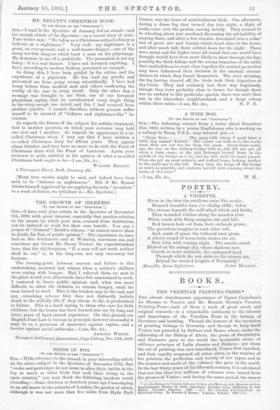THE GROWTH OF IDLENESS.
[TO THE EDITOR or THE " SPECTATOR."] SIR,—I have read your article in the Spectator of November -8th, 1890, with great interest, especially that portion relating to the means by which poor men, rescued from destitution, can be induced to work for their own benefit. You say, a propos of " General " Booth's scheme, " he cannot starve them to death, for fear of public opinion." The experience we have had on this Settlement, and at Wolseley, convinces me, and
• convinces my friend Mr. Harry Turner, the superintendent here, that the old Scripture, " If a man will not work, neither shall he eat," is, in the long-run, not only necessary but humane.
The turning-point between success and failure in this undertaking occurred last winter, when a settler's children were crying with hunger. Had I relieved them, no man in the place would ever afterwards have felt constrained to work. I ventured to brave public opinion, and, what was more difficult, to allow the children to remain hungry, until the man turned to work. This is the kindest way in the end, and .any colonising scheme that does not distinctly include death to the wilfully idle if they choose to die, is predestined to failure. This is a hard saying to those who care for little -children; but the lesson has been burned into me by long and bitter years of hard-earned experience. On this ground our English Poor-Law is vicious in principle, however successful it may be as a premium of insurance against rapine, and a barrier against social outbreaks.—I am, Sir, &e., ARNOLD WHITE. Tennyson Settlement, Queen stown, Cape Colony, Dec. 12th, 1890.
































 Previous page
Previous page